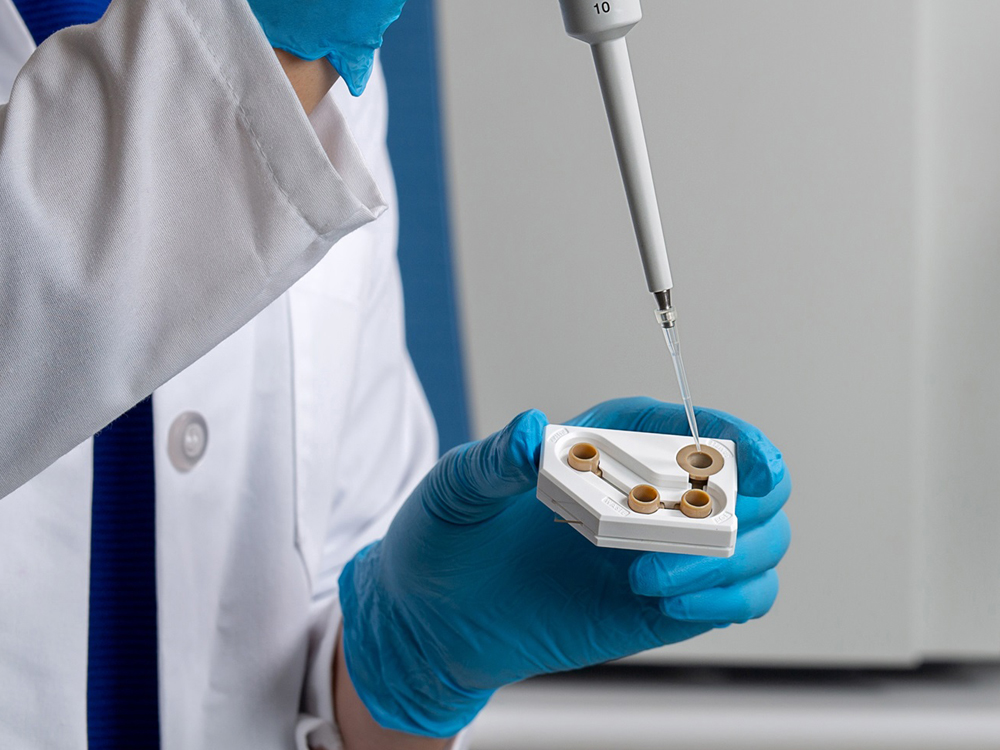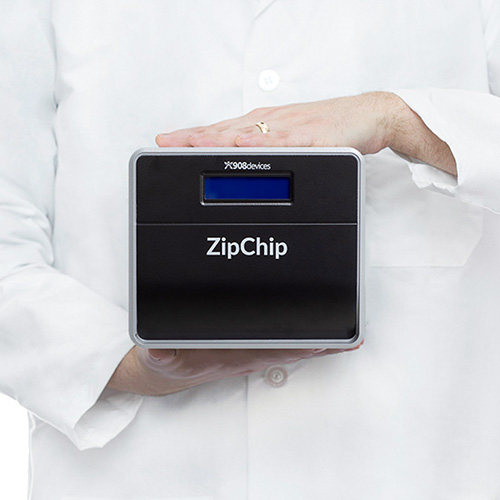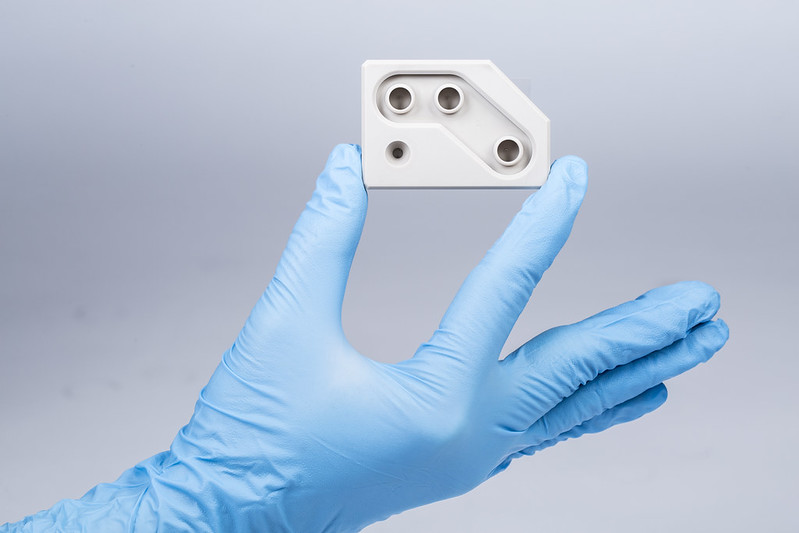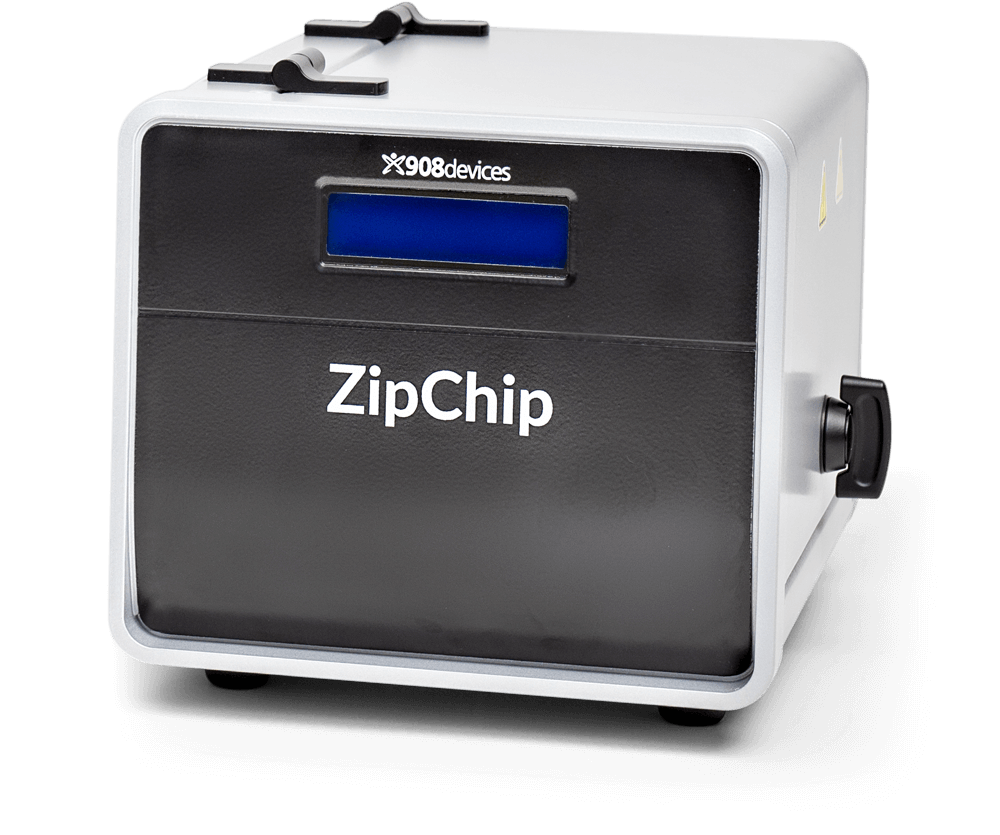Metabolomics
Zip through cohorts of biological extracts in minutes
Sample clean-up, derivatization and long analysis times don’t have to slow you down. With ZipChip, you’ll have the same information you get with other methods in a fraction of the time.

No Derivatization
Traditional analysis methods for small polar analytes like amino acids and metabolites take a lot of time between sample prep, clean-up and derivatization steps, and long analysis times. With ZipChip, there’s no clean-up or derivatization, just dilute your samples and you’re good to go! Qualitative and quantitative results are ready in just a few minutes.
Overcome Limitations of LC-MS Metabolomics
Liquid Chromatography-Mass Spectrometry (LC-MS) is a widely used technique in metabolomics, but it does have limitations. The integration of technologies such as ZipChip can help address some of these challenges. This makes it a valuable tool for enhancing the efficiency and effectiveness of metabolomics research.

Sample Complexity and Separation
- LC-MS can struggle with the separation of highly complex samples, leading to co-elution of metabolites and potential signal suppression. However, ZipChip’s microfluidic technology offers enhanced separation capabilities. This reduces co-elution and improves the detection of individual metabolites.
Analysis Time
- Traditional LC-MS methods can have lengthy run times, especially when dealing with complex samples. ZipChip provides rapid separation, significantly reducing the total analysis time. This increased throughput is essential in high-sample-volume studies.
Sensitivity and Detection of Low-Abundance Compounds
- Detecting low-abundance metabolites can be challenging utilizing LC-MS, due to sensitivity limits and noise levels. The efficient sample preparation and separation provided by ZipChip enhance the detection sensitivity, making it easier to identify and quantify low-abundance compounds.
Sample Preparation and Consumption
- LC-MS often requires extensive sample preparation and can consume more sample material, which can be problematic when sample volume is limited. ZipChip requires minimal sample preparation and operates with smaller sample volumes, preserving precious samples.
Reproducibility and Consistency
- Achieving high reproducibility can be challenging in LC-MS due to variations in column performance and other factors. The microfluidic chips in ZipChip offer more consistent performance, leading to higher reproducibility in results.
Flexibility in Analyte Types
- LC-MS can sometimes be limited in its ability to separate and analyze a diverse range of metabolite classes in a single run. ZipChip is designed to handle a broad range of metabolite classes, offering more flexibility in metabolomics studies.
Data Complexity and Processing
- The complex data sets generated by LC-MS can require extensive processing and analysis. But, ZipChip provides improved separation and detection capabilities which can lead to cleaner, more interpretable data sets, easing data processing and analysis.

Metabolomics Applications
No matter what your sample matrix is, with ZipChip you just dilute and shoot. That’s it!
CE Mass Spectrometry
ZipChip
Pop ZipChip on your mass spec as the source. It separates your samples and electrosprays them into your mass spec for analysis. There’s no optimization to do or connections to make. Click the chip in place and you’re off. Ready to go assay kits are optimized for each application – no method development needed.
ZipChip Resources:

Frequently Asked Questions
How does ZipChip enhance sample prep and separation in metabolomics?
Microfluidic Chip Technology: ZipChip uses a microfluidic chip that enables rapid and efficient separation of complex biological samples. This is especially beneficial for metabolomics, where samples often contain a wide range of metabolites with different chemical properties.
Reduced Sample Complexity: By separating metabolites before they enter the mass spectrometer, ZipChip helps reduce the complexity of the sample. This can lead to better detection and identification of low-abundance metabolites.
How can ZipChip with HRMS Improve Metabolite Detection and Identification?
High-Resolution Mass Spectrometry: When coupled with HRMS, ZipChip provides high-resolution, accurate mass data. This is crucial for identifying metabolites in complex biological samples.
Better Sensitivity: The combination allows for the detection of metabolites at very low concentrations, which is often necessary in metabolomics studies to understand subtle metabolic changes.
How can ZipChip improve analysis and sample throughput for Metabolomic Analysis?
Rapid Analysis: ZipChip’s microfluidic technology allows for much faster analysis compared to traditional liquid chromatography methods. This increased throughput is beneficial in metabolomics, where large numbers of samples are often analyzed.
Compatibility with Various Samples: ZipChip can handle a variety of sample types, which is important in metabolomics where samples can range from body fluids to tissue extracts.
What types of Metabolomics Applications has ZipChip been used?
ZipChip is applicable in various fields of metabolomics research, including clinical metabolomics, isotope tracing, drug development, environmental testing, and nutritional studies.
How does ZipChip assist in Metabolomic Analysis?
Imagine trying to quickly sort and catalog every item in the market under time pressure. The ZipChip streamlines this process in the lab by preparing and separating metabolites for analysis with incredible efficiency. Using Capillary Electrophoresis (CE) integrated with mass spectrometry (MS), the ZipChip sorts metabolites based on their size and charge, allowing for rapid, sensitive, and high-resolution analysis.
email Subscribe to Our Communications Signup to receive new product updates, technical tips and more.